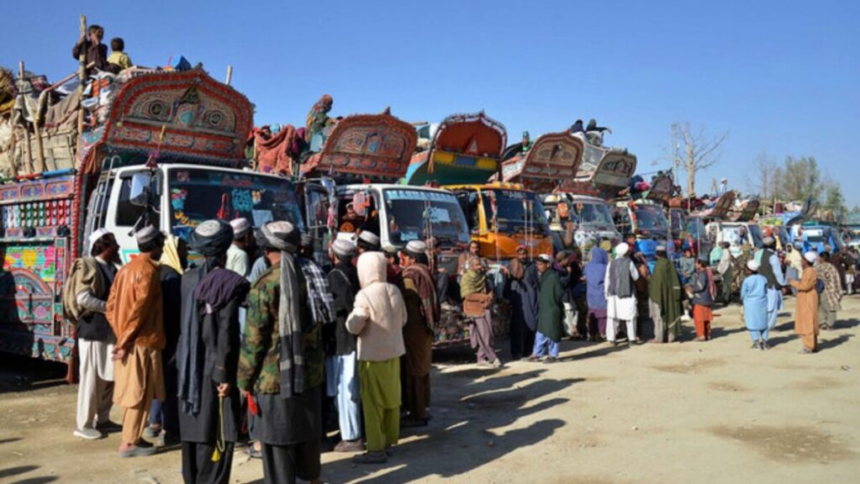RASC News Agency: The Taliban-controlled Commission for Refugee Affairs has reported that on Monday, October 27, a total of 7,324 Afghanistani migrants were expelled from Pakistan in a single day. According to Bakhtar News Agency, which operates under the Taliban’s supervision, the expelled individuals entered Afghanistan through the Spin Boldak and Brahmcha border crossings in Kandahar and Nimroz provinces.
In the same report, the Taliban’s Commission added that 645 additional Afghanistani migrants were deported from Iran on the same day, crossing back into the country through Islam Qala and Pul-e-Abrisham border points in Herat.
Reports indicate that Iran has recently intensified its policy of forced repatriation of Afghanistani migrants. Entry into Iran is now restricted solely to those holding valid labor visas issued by the Iranian Embassy in Kabul. Tehran has described this initiative, known as the “Kafeel Plan” (or “Sponsor Program”), as a framework intended to “benefit Afghanistani laborers and support Iran’s domestic economy.” However, human rights observers argue that the policy has instead placed thousands of vulnerable families at risk of destitution and abuse.
Meanwhile, Pakistan has also escalated its deportation campaign following an eight-day border conflict with Taliban forces earlier this month. Acting on the directive of Prime Minister Shehbaz Sharif, Islamabad has reportedly accelerated the mass expulsion of undocumented Afghanistani nationals. According to previous records, just a day earlier on Sunday, October 26 Pakistan had expelled 7,996 individuals, marking one of the largest single-day deportations in recent years. Analysts believe this unprecedented crackdown reflects mounting tensions between Pakistan and the Taliban, who continue to accuse each other of cross-border militancy and destabilization.
At the same time, numerous returnees from Iran have spoken to international organizations and local media, alleging they were subjected to mistreatment, including beatings and prolonged detention, during their forced return. Some have reported being held for days without food or water in overcrowded detention centers. Iranian authorities, however, deny the allegations, claiming their operations target only those lacking valid legal documents and insisting that deportations are carried out “voluntarily.”
Human rights experts and international agencies have expressed serious concern over this growing wave of expulsions. They warn that the mass return of migrants to Taliban-controlled Afghanistan, a country already reeling under economic collapse, hunger, and systematic repression, could trigger a humanitarian disaster. Thousands of families, they say, are being pushed back into a nation where poverty is deepening and the Taliban’s repressive rule leaves little room for survival, especially for women, minorities, and dissenters.
Observers note that many returnees face arbitrary detention, persecution, or forced recruitment upon their return, as the Taliban continues to tighten its grip on the population through fear and intimidation. The regime, which lacks international recognition, has shown neither capacity nor willingness to protect vulnerable citizens.
Ultimately, this surge in deportations highlights the increasing regional pressure on Afghanistani refugees, who find themselves trapped between hostile host governments and an oppressive Taliban regime. It also raises pressing moral and legal questions about the responsibility of neighboring states particularly Pakistan and Iran to uphold fundamental human rights and ensure that no person is returned to a territory where their life or freedom may be threatened.






